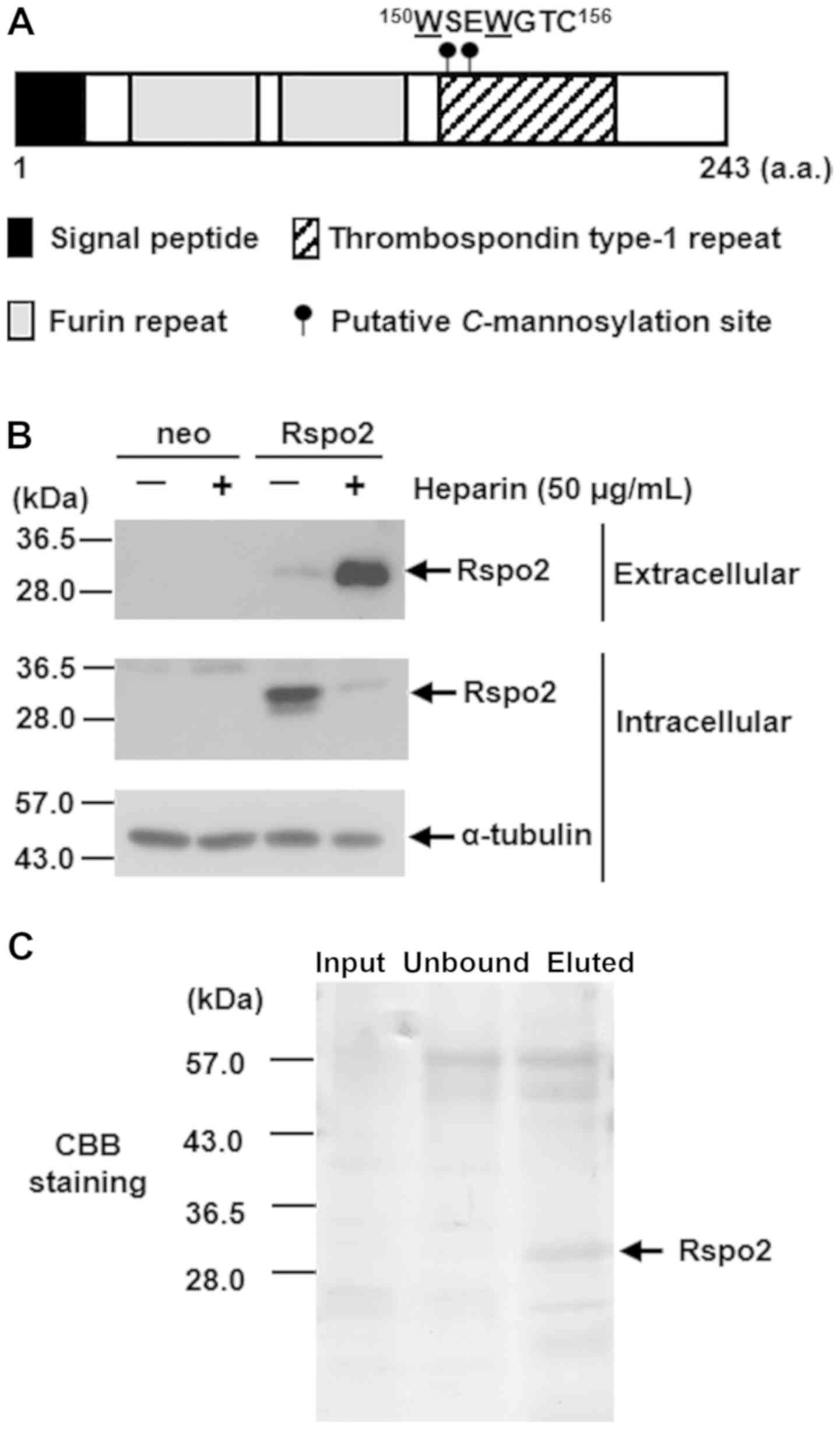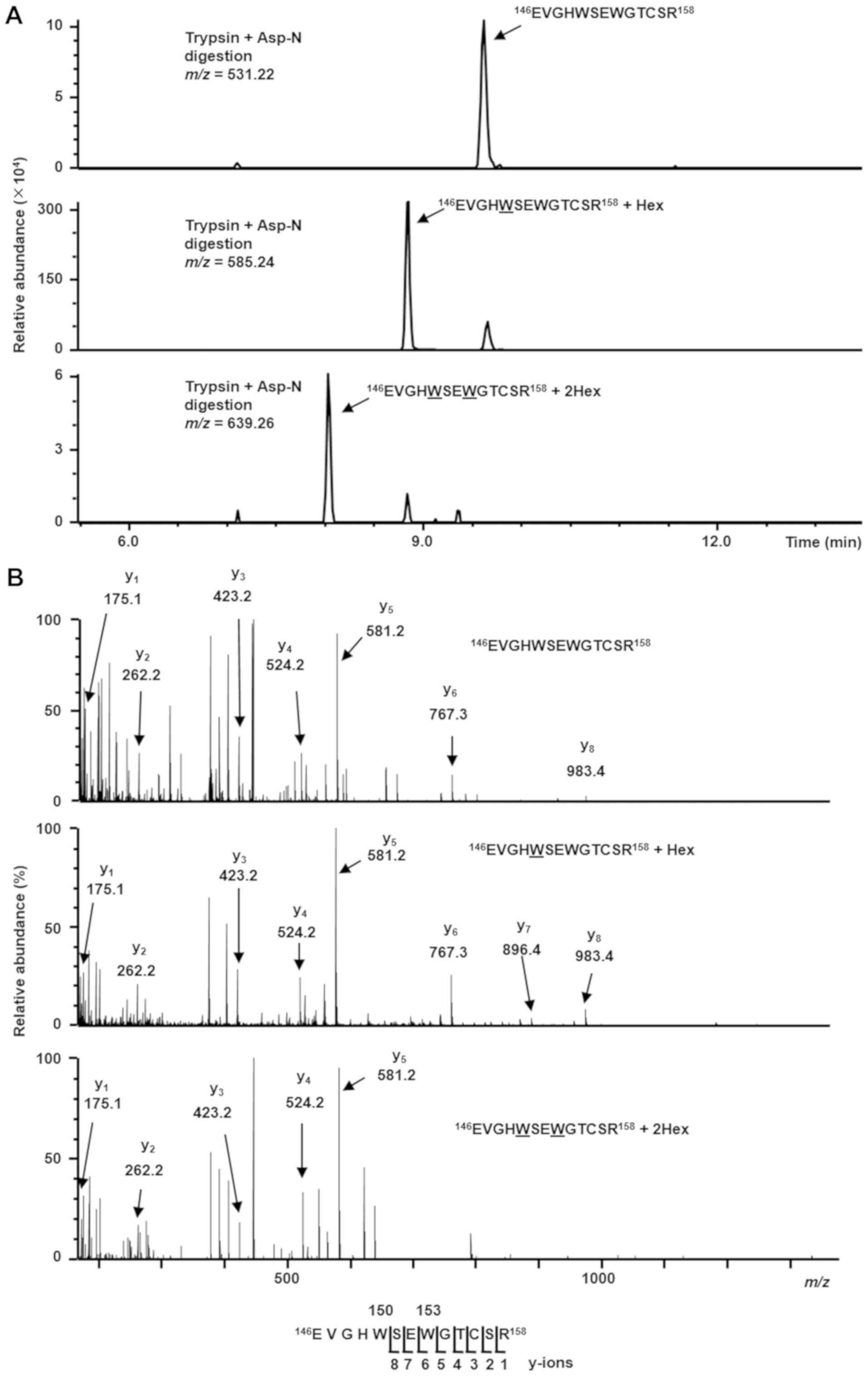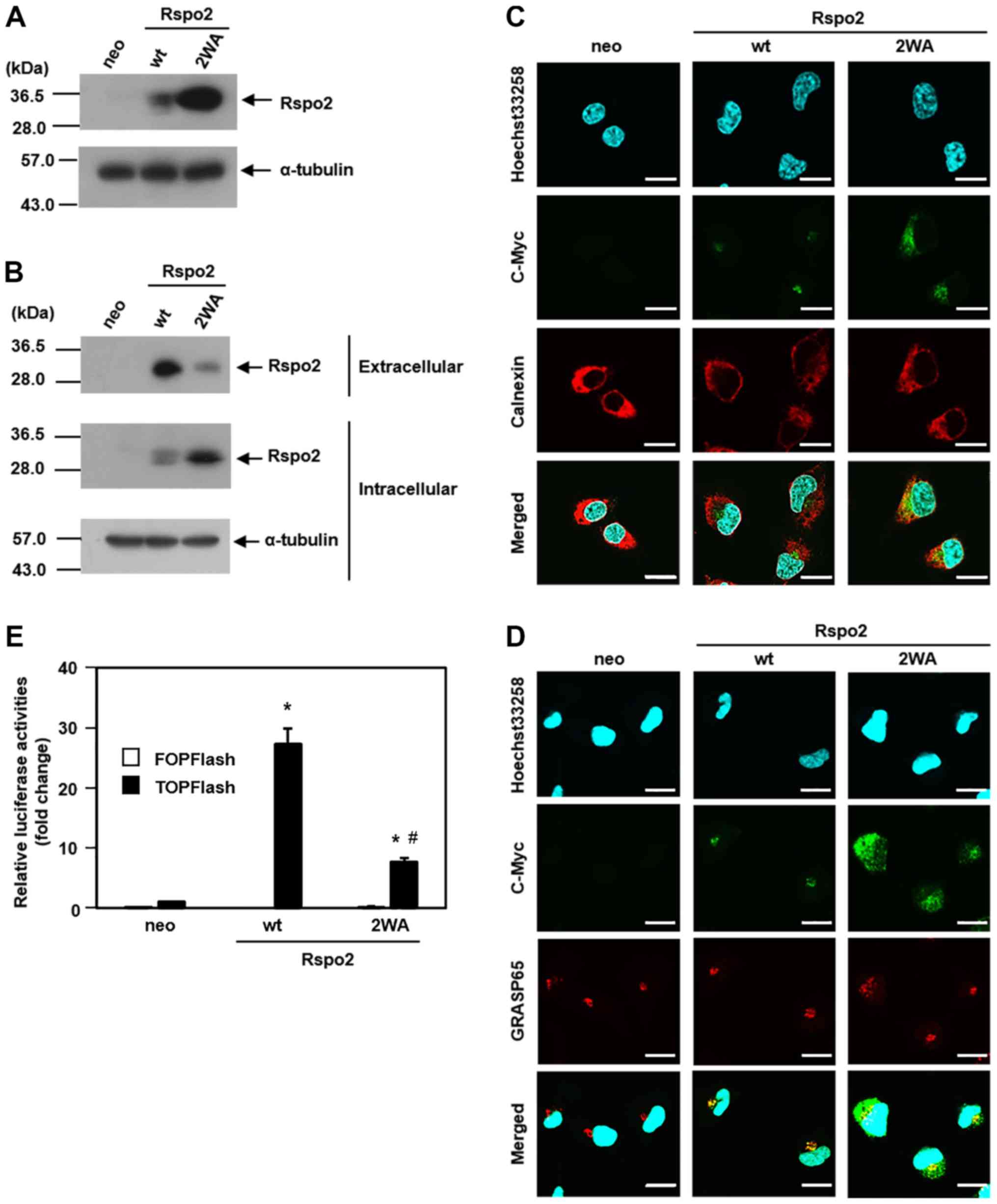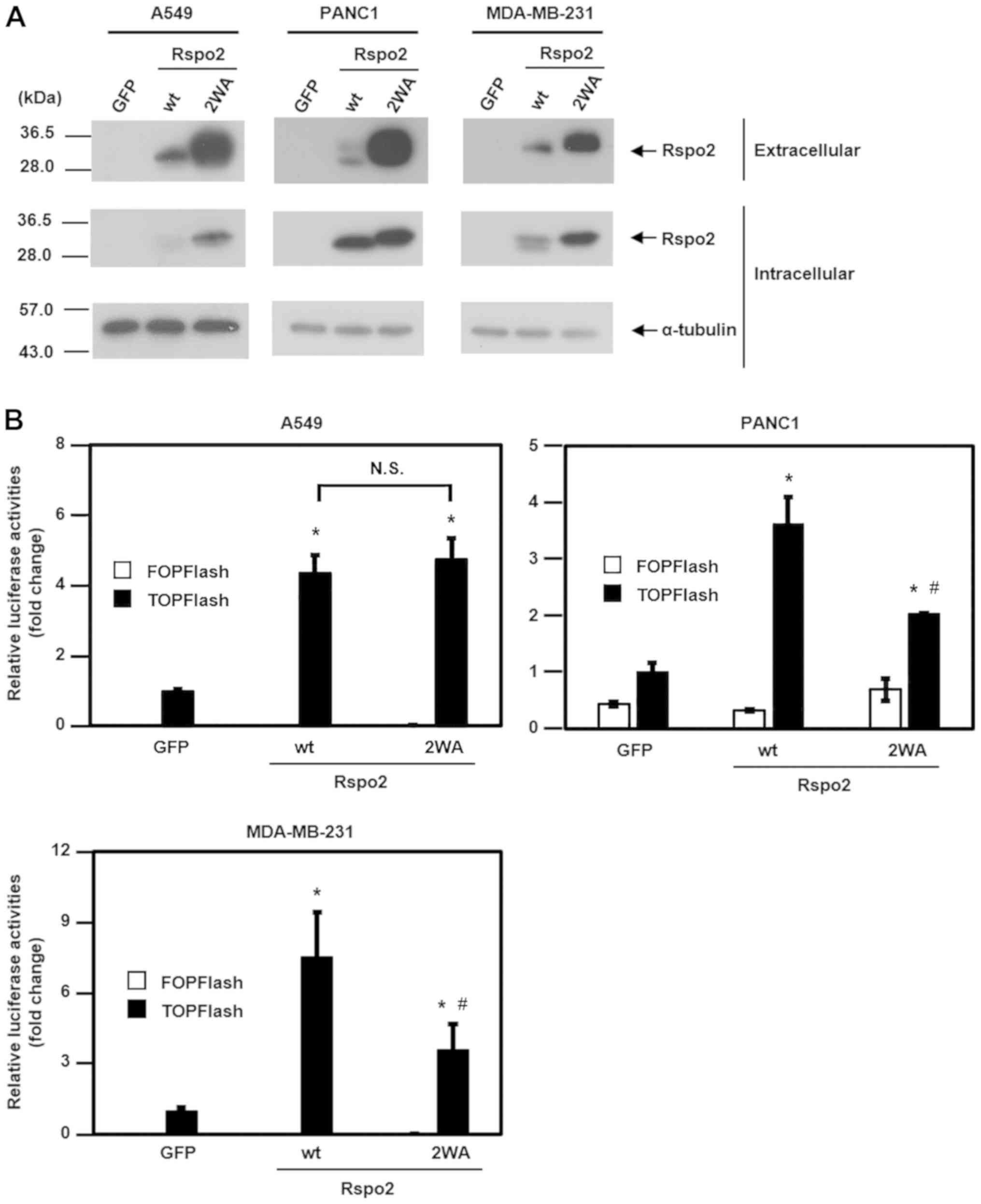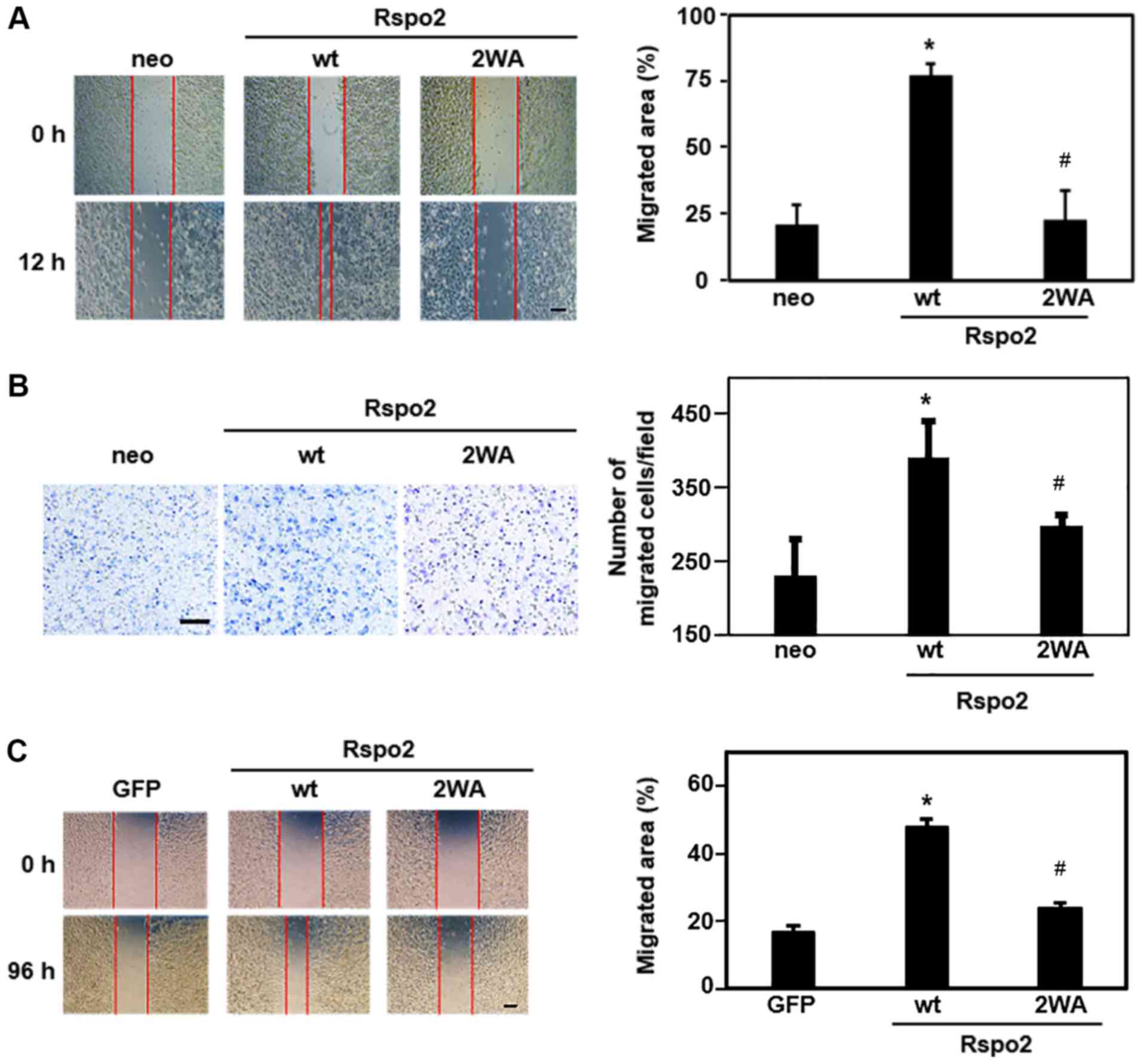|
1
|
Kamata T, Katsube K, Michikawa M, Yamada
M, Takada S and Mizusawa H: R-spondin, a novel gene with
thrombospondin type 1 domain, was expressed in the dorsal neural
tube and affected in Wnts mutants. Biochim Biophys Acta.
1676:51–62. 2004. View Article : Google Scholar : PubMed/NCBI
|
|
2
|
Kazanskaya O, Glinka A, del Barco
Barrantes I, Stannek P, Niehrs C and Wu W: R-Spondin2 is a secreted
activator of Wnt/β-catenin signaling and is required for Xenopus
myogenesis. Dev Cell. 7:525–534. 2004. View Article : Google Scholar : PubMed/NCBI
|
|
3
|
de Lau WB, Snel B and Clevers HC: The
R-spondin protein family. Genome Biol. 13:2422012. View Article : Google Scholar : PubMed/NCBI
|
|
4
|
Kim KA, Zhao J, Andarmani S, Kakitani M,
Oshima T, Binnerts ME, Abo A, Tomizuka K and Funk WD: R-Spondin
proteins: A novel link to β-catenin activation. Cell Cycle.
5:23–26. 2006. View Article : Google Scholar
|
|
5
|
Carmon KS, Gong X, Lin Q, Thomas A and Liu
Q: R-spondins function as ligands of the orphan receptors LGR4 and
LGR5 to regulate Wnt/β-catenin signaling. Proc Natl Acad Sci USA.
108:11452–11457. 2011. View Article : Google Scholar
|
|
6
|
de Lau W, Barker N, Low TY, Koo BK, Li
VSW, Teunissen H, Kujala P, Haegebarth A, Peters PJ, van de
Wetering M, et al: Lgr5 homologues associate with Wnt receptors and
mediate R-spondin signalling. Nature. 476:293–297. 2011. View Article : Google Scholar : PubMed/NCBI
|
|
7
|
Glinka A, Dolde C, Kirsch N, Huang YL,
Kazanskaya O, Ingelfinger D, Boutros M, Cruciat CM and Niehrs C:
LGR4 and LGR5 are R-spondin receptors mediating Wnt/β-catenin and
Wnt/PCP signalling. EMBO Rep. 12:1055–1061. 2011. View Article : Google Scholar : PubMed/NCBI
|
|
8
|
Hao HX, Xie Y, Zhang Y, Charlat O, Oster
E, Avello M, Lei H, Mickanin C, Liu D, Ruffner H, et al: ZNRF3
promotes Wnt receptor turnover in an R-spondin-sensitive manner.
Nature. 485:195–200. 2012. View Article : Google Scholar : PubMed/NCBI
|
|
9
|
Anastas JN and Moon RT: WNT signalling
pathways as therapeutic targets in cancer. Nat Rev Cancer.
13:11–26. 2013. View Article : Google Scholar
|
|
10
|
Cisternas P, Henriquez JP, Brandan E and
Inestrosa NC: Wnt signaling in skeletal muscle dynamics:
Myogenesis, neuromuscular synapse and fibrosis. Mol Neurobiol.
49:574–589. 2014. View Article : Google Scholar
|
|
11
|
van Amerongen R and Berns A: Knockout
mouse models to study Wnt signal transduction. Trends Genet.
22:678–689. 2006. View Article : Google Scholar : PubMed/NCBI
|
|
12
|
Kawakami Y, Rodriguez Esteban C, Raya M,
Kawakami H, Martí M, Dubova I and Izpisúa Belmonte JC:
Wnt/β-catenin signaling regulates vertebrate limb regeneration.
Genes Dev. 20:3232–3237. 2006. View Article : Google Scholar : PubMed/NCBI
|
|
13
|
Nusse R and Clevers H: Wnt/β-Catenin
signaling, disease, and emerging therapeutic modalities. Cell.
169:985–999. 2017. View Article : Google Scholar : PubMed/NCBI
|
|
14
|
Bell SM, Schreiner CM, Wert SE, Mucenski
ML, Scott WJ and Whitsett JA: R-spondin 2 is required for normal
laryngeal-tracheal, lung and limb morphogenesis. Development.
135:1049–1058. 2008. View Article : Google Scholar : PubMed/NCBI
|
|
15
|
Aoki M, Kiyonari H, Nakamura H and Okamoto
H: R-spondin2 expression in the apical ectodermal ridge is
essential for outgrowth and patterning in mouse limb development.
Dev Growth Differ. 50:85–95. 2008. View Article : Google Scholar
|
|
16
|
Abed É, Chan TF, Delalandre A,
Martel-Pelletier J, Pelletier JP and Lajeunesse D: R-spondins are
newly recognized players in osteoarthritis that regulate Wnt
signaling in osteoblasts. Arthritis Rheum. 63:3865–3875. 2011.
View Article : Google Scholar : PubMed/NCBI
|
|
17
|
Han XH, Jin YR, Seto M and Yoon JK: A
WNT/β-catenin signaling activator, R-spondin, plays positive
regulatory roles during skeletal myogenesis. J Biol Chem.
286:10649–10659. 2011. View Article : Google Scholar : PubMed/NCBI
|
|
18
|
Wu C, Qiu S, Lu L, Zou J, Li WF, Wang O,
Zhao H, Wang H, Tang J, Chen L, et al: RSPO2-LGR5 signaling has
tumour-suppressive activity in colorectal cancer. Nat Commun.
5:31492014. View Article : Google Scholar : PubMed/NCBI
|
|
19
|
Yin X, Yi H, Wang L, Wu W, Wu X and Yu L:
R-spondin 2 promotes proliferation and migration via the
Wnt/β-catenin pathway in human hepatocellular carcinoma. Oncol
Lett. 14:1757–1765. 2017. View Article : Google Scholar : PubMed/NCBI
|
|
20
|
Ilmer M, Boiles AR, Regel I, Yokoi K,
Michalski CW, Wistuba II, Rodriguez J, Alt E and Vykoukal J: RSPO2
enhances canonical Wnt signaling to confer stemness-associated
traits to susceptible pancreatic cancer cells. Cancer Res.
75:1883–1896. 2015. View Article : Google Scholar : PubMed/NCBI
|
|
21
|
Krieg J, Hartmann S, Vicentini A, Gläsner
W, Hess D and Hofsteenge J: Recognition signal for C-mannosylation
of Trp-7 in RNase 2 consists of sequence Trp-x-x-Trp. Mol Biol
Cell. 9:301–309. 1998. View Article : Google Scholar : PubMed/NCBI
|
|
22
|
Julenius K: NetCGlyc 1.0: Prediction of
mammalian C-mannosylation sites. Glycobiology. 17:868–876. 2007.
View Article : Google Scholar : PubMed/NCBI
|
|
23
|
Hofsteenge J, Müller DR, de Beer T,
Löffler A, Richter WJ and Vliegenthart JFG: New type of linkage
between a carbohydrate and a protein: C-glycosylation of a specific
tryptophan residue in human RNase Us. Biochemistry. 33:13524–13530.
1994. View Article : Google Scholar : PubMed/NCBI
|
|
24
|
Niwa Y and Simizu S: C-mannosylation:
Previous studies and future research perspectives. Trends Glycosci
Glycotechnol. 30:E231–E238. 2018. View Article : Google Scholar
|
|
25
|
Krieg J, Gläsner W, Vicentini A, Doucey
MA, Löffler A, Hess D and Hofsteenge J: C-Mannosylation of human
RNase 2 is an intracellular process performed by a variety of
cultured cells. J Biol Chem. 272:26687–26692. 1997. View Article : Google Scholar : PubMed/NCBI
|
|
26
|
Morishita S, Suzuki T, Niwa Y, Dohmae N
and Simizu S: Dpy-19 like 3-mediated C-mannosylation and expression
levels of RPE-spondin in human tumor cell lines. Oncol Lett.
14:2537–2544. 2017. View Article : Google Scholar : PubMed/NCBI
|
|
27
|
Otani K, Niwa Y, Suzuki T, Sato N,
Sasazawa Y, Dohmae N and Simizu S: Regulation of granulocyte
colony-stimulating factor receptor-mediated granulocytic
differentiation by C-mannosylation. Biochem Biophys Res Commun.
498:466–472. 2018. View Article : Google Scholar : PubMed/NCBI
|
|
28
|
Sasazawa Y, Sato N, Suzuki T, Dohmae N and
Simizu S: C-Mannosylation of thrombopoietin receptor (c-Mpl)
regulates thrombopoietin-dependent JAK-STAT signaling. Biochem
Biophys Res Commun. 468:262–268. 2015. View Article : Google Scholar : PubMed/NCBI
|
|
29
|
Goto Y, Niwa Y, Suzuki T, Dohmae N,
Umezawa K and Simizu S: C-mannosylation of human hyaluronidase 1:
Possible roles for secretion and enzymatic activity. Int J Oncol.
45:344–350. 2014. View Article : Google Scholar : PubMed/NCBI
|
|
30
|
Niwa Y, Suzuki T, Dohmae N and Simizu S:
Identification of DPY19L3 as the C-mannosyltransferase of
R-spondin1 in human cells. Mol Biol Cell. 27:744–756. 2016.
View Article : Google Scholar : PubMed/NCBI
|
|
31
|
Perez-Vilar J, Randell SH and Boucher RC:
C-Mannosylation of MUC5AC and MUC5B Cys subdomains. Glycobiology.
14:325–337. 2004. View Article : Google Scholar : PubMed/NCBI
|
|
32
|
Ihara Y, Manabe S, Ikezaki M, Inai Y,
Matsui ISL, Ohta Y, Muroi E and Ito Y: C-Mannosylated peptides
derived from the thrombospondin type 1 repeat interact with Hsc70
to modulate its signaling in RAW264.7 cells. Glycobiology.
20:1298–1310. 2010. View Article : Google Scholar : PubMed/NCBI
|
|
33
|
Buettner FF, Ashikov A, Tiemann B, Lehle L
and Bakker H: C. elegans DPY-19 is a C-mannosyltransferase
glycosylating thrombospondin repeats. Mol Cell. 50:295–302. 2013.
View Article : Google Scholar : PubMed/NCBI
|
|
34
|
Shcherbakova A, Tiemann B, Buettner FFR
and Bakker H: Distinct C-mannosylation of netrin receptor
thrombospondin type 1 repeats by mammalian DPY19L1 and DPY19L3.
Proc Natl Acad Sci USA. 114:2574–2579. 2017. View Article : Google Scholar
|
|
35
|
Fujiwara M, Kato S, Niwa Y, Suzuki T,
Tsuchiya M, Sasazawa Y, Dohmae N and Simizu S: C-mannosylation of
R-spondin3 regulates its secretion and activity of Wnt/β-catenin
signaling in cells. FEBS Lett. 590:2639–2649. 2016. View Article : Google Scholar : PubMed/NCBI
|
|
36
|
Dong X, Liao W, Zhang L, Tu X, Hu J, Chen
T, Dai X, Xiong Y, Liang W, Ding C, et al: RSPO2 suppresses
colorectal cancer metastasis by counteracting the Wnt5a/Fzd7-driven
nonca-nonical Wnt pathway. Cancer Lett. 402:153–165. 2017.
View Article : Google Scholar : PubMed/NCBI
|
|
37
|
Tsuchiya M, Niwa Y and Simizu S:
N-glycosylation of R-spondin1 at Asn137 negatively regulates its
secretion and Wnt/β-catenin signaling-enhancing activity. Oncol
Lett. 11:3279–3286. 2016. View Article : Google Scholar : PubMed/NCBI
|
|
38
|
Miyazaki S, Sasazawa Y, Mogi T, Suzuki T,
Yoshida K, Dohmae N, Takao K and Simizu S: Identification of
seco-clavi-lactone B as a small-molecule actin polymerization
inhibitor. FEBS Lett. 590:1163–1173. 2016. View Article : Google Scholar : PubMed/NCBI
|
|
39
|
Miyazaki I, Simizu S, Ichimiya H, Kawatani
M and Osada H: Robust and systematic drug screening method using
chemical arrays and the protein library: Identification of novel
inhibitors of carbonic anhydrase II. Biosci Biotechnol Biochem.
72:2739–2749. 2008. View Article : Google Scholar : PubMed/NCBI
|
|
40
|
Kawahara R, Niwa Y and Simizu S: Integrin
β1 is an essential factor in vasculogenic mimicry of human cancer
cells. Cancer Sci. 109:2490–2496. 2018. View Article : Google Scholar : PubMed/NCBI
|
|
41
|
Niwa Y, Suzuki T, Dohmae N and Simizu S:
O-Fucosylation of CCN1 is required for its secretion. FEBS Lett.
589:3287–3293. 2015. View Article : Google Scholar : PubMed/NCBI
|
|
42
|
Yasukagawa T, Niwa Y, Simizu S and Umezawa
K: Suppression of cellular invasion by glybenclamide through
inhibited secretion of platelet-derived growth factor in ovarian
clear cell carcinoma ES-2 cells. FEBS Lett. 586:1504–1509. 2012.
View Article : Google Scholar : PubMed/NCBI
|
|
43
|
Simizu S, Umezawa K, Takada M, Arber N and
Imoto M: Induction of hydrogen peroxide production and Bax
expression by caspase-3(-like) proteases in tyrosine kinase
inhibitor-induced apoptosis in human small cell lung carcinoma
cells. Exp Cell Res. 238:197–203. 1998. View Article : Google Scholar : PubMed/NCBI
|
|
44
|
Matsuki W, Miyazaki S, Yoshida K, Ogura A,
Sasazawa Y, Takao KI and Simizu S: Synthesis and evaluation of
biological activities of vibsanin A analogs. Bioorg Med Chem Lett.
27:4536–4539. 2017. View Article : Google Scholar : PubMed/NCBI
|
|
45
|
Veeman MT, Slusarski DC, Kaykas A, Louie
SH and Moon RT: Zebrafish prickle, a modulator of noncanonical
Wnt/Fz signaling, regulates gastrulation movements. Curr Biol.
13:680–685. 2003. View Article : Google Scholar : PubMed/NCBI
|
|
46
|
Willert K, Brown JD, Danenberg E, Duncan
AW, Weissman IL, Reya T, Yates JR III and Nusse R: Wnt proteins are
lipid-modified and can act as stem cell growth factors. Nature.
423:448–452. 2003. View Article : Google Scholar : PubMed/NCBI
|
|
47
|
Komai K, Niwa Y, Sasazawa Y and Simizu S:
Pirin regulates epithelial to mesenchymal transition independently
of Bcl3-Slug signaling. FEBS Lett. 589:738–743. 2015. View Article : Google Scholar : PubMed/NCBI
|
|
48
|
Ishida K, Wierzba MK, Teruya T, Simizu S
and Osada H: Novel heparan sulfate mimetic compounds as antitumor
agents. Chem Biol. 11:367–377. 2004. View Article : Google Scholar : PubMed/NCBI
|
|
49
|
Nam JS, Turcotte TJ, Smith PF, Choi S and
Yoon JK: Mouse cristin/R-spondin family proteins are novel ligands
for the Frizzled 8 and LRP6 receptors and activate
β-catenin-dependent gene expression. J Biol Chem. 281:13247–13257.
2006. View Article : Google Scholar : PubMed/NCBI
|
|
50
|
Hirschberg K, Miller CM, Ellenberg J,
Presley JF, Siggia ED, Phair RD and Lippincott-Schwartz J: Kinetic
analysis of secretory protein traffic and characterization of golgi
to plasma membrane transport intermediates in living cells. J Cell
Biol. 143:1485–1503. 1998. View Article : Google Scholar : PubMed/NCBI
|
|
51
|
Komekado H, Yamamoto H, Chiba T and
Kikuchi A: Glycosylation and palmitoylation of Wnt-3a are coupled
to produce an active form of Wnt-3a. Genes Cells. 12:521–534. 2007.
View Article : Google Scholar : PubMed/NCBI
|
|
52
|
Hendee K, Wang LW, Reis LM, Rice GM, Apte
SS and Semina EV: Identification and functional analysis of an
ADAMTSL1 variant associated with a complex phenotype including
congenital glaucoma, craniofacial, and other systemic features in a
three-generation human pedigree. Hum Mutat. 38:1485–1490. 2017.
View Article : Google Scholar : PubMed/NCBI
|
|
53
|
Wang LW, Leonhard-Melief C, Haltiwanger RS
and Apte SS: Post-translational modification of thrombospondin
type-1 repeats in ADAMTS-like 1/punctin-1 by C-mannosylation of
tryptophan. J Biol Chem. 284:30004–30015. 2009. View Article : Google Scholar : PubMed/NCBI
|
|
54
|
Li JS, Cui L, Rock DL and Li J: Novel
glycosidic linkage in Aedes aegypti chorion peroxidase: N-mannosyl
tryptophan. J Biol Chem. 280:38513–38521. 2005. View Article : Google Scholar : PubMed/NCBI
|
|
55
|
Brunner F, Wirtz W, Rose JKC, Darvill AG,
Govers F, Scheel D and Nürnberger T: A β-glucosidase/xylosidase
from the phytopathogenic oomycete, Phytophthora infestans.
Phytochemistry. 59:689–696. 2002. View Article : Google Scholar : PubMed/NCBI
|
|
56
|
Moremen KW, Tiemeyer M and Nairn AV:
Vertebrate protein glycosylation: Diversity, synthesis and
function. Nat Rev Mol Cell Biol. 13:448–462. 2012. View Article : Google Scholar : PubMed/NCBI
|
|
57
|
Doucey MA, Hess D, Cacan R and Hofsteenge
J: Protein C-mannosylation is enzyme-catalysed and uses
dolichyl-phosphate-mannose as a precursor. Mol Biol Cell.
9:291–300. 1998. View Article : Google Scholar : PubMed/NCBI
|
|
58
|
Anand M, Rush JS, Ray S, Doucey MA, Weik
J, Ware FE, Hofsteenge J, Waechter CJ and Lehrman MA: Requirement
of the Lec35 gene for all known classes of
mono-saccharide-P-dolichol-dependent glycosyltransferase reactions
in mammals. Mol Biol Cell. 12:487–501. 2001. View Article : Google Scholar : PubMed/NCBI
|















